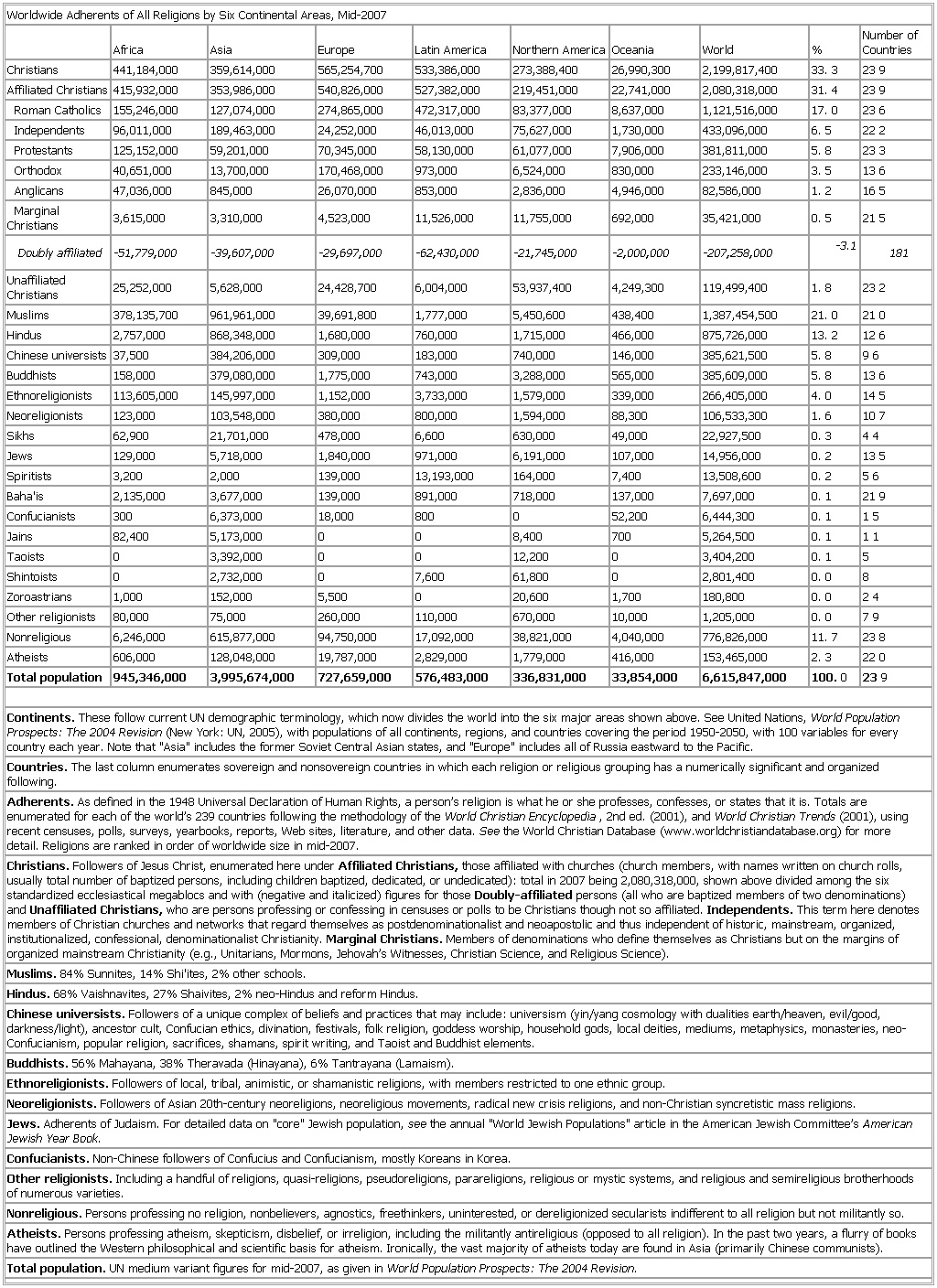- Worldwide Adherents of All Religions by Six Continental Areas, Mid-2007
-
▪ TableWorldwide Adherents of All Religions by Six Continental Areas, Mid-2007Africa Asia Europe Latin America Northern America Oceania World % Number of CountriesChristians 441,184,000 359,614,000 565,254,700 533,386,000 273,388,400 26,990,300 2,199,817,400 33.3 239Affiliated Christians 415,932,000 353,986,000 540,826,000 527,382,000 219,451,000 22,741,000 2,080,318,000 31.4 239Roman Catholics 155,246,000 127,074,000 274,865,000 472,317,000 83,377,000 8,637,000 1,121,516,000 17.0 236Independents 96,011,000 189,463,000 24,252,000 46,013,000 75,627,000 1,730,000 433,096,000 6.5 222Protestants 125,152,000 59,201,000 70,345,000 58,130,000 61,077,000 7,906,000 381,811,000 5.8 233Orthodox 40,651,000 13,700,000 170,468,000 973,000 6,524,000 830,000 233,146,000 3.5 136Anglicans 47,036,000 845,000 26,070,000 853,000 2,836,000 4,946,000 82,586,000 1.2 165Marginal Christians 3,615,000 3,310,000 4,523,000 11,526,000 11,755,000 692,000 35,421,000 0.5 215Doubly affiliated -51,779,000 -39,607,000 -29,697,000 -62,430,000 -21,745,000 -2,000,000 -207,258,000 3.1 -3.1 181 181Unaffiliated Christians 25,252,000 5,628,000 24,428,700 6,004,000 53,937,400 4,249,300 119,499,400 1.8 232Muslims 378,135,700 961,961,000 39,691,800 1,777,000 5,450,600 438,400 1,387,454,500 21.0 210Hindus 2,757,000 868,348,000 1,680,000 760,000 1,715,000 466,000 875,726,000 13.2 126Chinese universists 37,500 384,206,000 309,000 183,000 740,000 146,000 385,621,500 5.8 96Buddhists 158,000 379,080,000 1,775,000 743,000 3,288,000 565,000 385,609,000 5.8 136Ethnoreligionists 113,605,000 145,997,000 1,152,000 3,733,000 1,579,000 339,000 266,405,000 4.0 145Neoreligionists 123,000 103,548,000 380,000 800,000 1,594,000 88,300 106,533,300 1.6 107Sikhs 62,900 21,701,000 478,000 6,600 630,000 49,000 22,927,500 0.3 44Jews 129,000 5,718,000 1,840,000 971,000 6,191,000 107,000 14,956,000 0.2 135Spiritists 3,200 2,000 139,000 13,193,000 164,000 7,400 13,508,600 0.2 56Baha'is 2,135,000 3,677,000 139,000 891,000 718,000 137,000 7,697,000 0.1 219Confucianists 300 6,373,000 18,000 800 0 52,200 6,444,300 0.1 15Jains 82,400 5,173,000 0 0 8,400 700 5,264,500 0.1 11Taoists 0 3,392,000 0 0 12,200 0 3,404,200 0.1 5Shintoists 0 2,732,000 0 7,600 61,800 0 2,801,400 0.0 8Zoroastrians 1,000 152,000 5,500 0 20,600 1,700 180,800 0.0 24Other religionists 80,000 75,000 260,000 110,000 670,000 10,000 1,205,000 0.0 79Nonreligious 6,246,000 615,877,000 94,750,000 17,092,000 38,821,000 4,040,000 776,826,000 11.7 238Atheists 606,000 128,048,000 19,787,000 2,829,000 1,779,000 416,000 153,465,000 2.3 220Total population 945,346,000 3,995,674,000 727,659,000 576,483,000 336,831,000 33,854,000 6,615,847,000 100.0 239Continents. These follow current UN demographic terminology, which now divides the world into the six major areas shown above. See United Nations, World Population Prospects: The 2004 Revision (New York: UN, 2005), with populations of all continents, regions, and countries covering the period 1950-2050, with 100 variables for every country each year. Note that "Asia" includes the former Soviet Central Asian states, and "Europe" includes all of Russia eastward to the Pacific.Countries. The last column enumerates sovereign and nonsovereign countries in which each religion or religious grouping has a numerically significant and organized following.Adherents. As defined in the 1948 Universal Declaration of Human Rights, a person’s religion is what he or she professes, confesses, or states that it is. Totals are enumerated for each of the world’s 239 countries following the methodology of the World Christian Encyclopedia, 2nd ed. (2001), and World Christian Trends (2001), using recent censuses, polls, surveys, yearbooks, reports, Web sites, literature, and other data. See the World Christian Database (www.worldchristiandatabase.org) for more detail. Religions are ranked in order of worldwide size in mid-2007.Christians. Followers of Jesus Christ, enumerated here under Affiliated Christians, those affiliated with churches (church members, with names written on church rolls, usually total number of baptized persons, including children baptized, dedicated, or undedicated): total in 2007 being 2,080,318,000, shown above divided among the six standardized ecclesiastical megablocs and with (negative and italicized) figures for those Doubly-affiliated persons (all who are baptized members of two denominations) and Unaffiliated Christians, who are persons professing or confessing in censuses or polls to be Christians though not so affiliated. Independents. This term here denotes members of Christian churches and networks that regard themselves as postdenominationalist and neoapostolic and thus independent of historic, mainstream, organized, institutionalized, confessional, denominationalist Christianity. Marginal Christians. Members of denominations who define themselves as Christians but on the margins of organized mainstream Christianity (e.g., Unitarians, Mormons, Jehovah’s Witnesses, Christian Science, and Religious Science).Muslims. 84% Sunnites, 14% Shi'ites, 2% other schools.Hindus. 68% Vaishnavites, 27% Shaivites, 2% neo-Hindus and reform Hindus.Chinese universists. Followers of a unique complex of beliefs and practices that may include: universism (yin/yang cosmology with dualities earth/heaven, evil/good, darkness/light), ancestor cult, Confucian ethics, divination, festivals, folk religion, goddess worship, household gods, local deities, mediums, metaphysics, monasteries, neo-Confucianism, popular religion, sacrifices, shamans, spirit writing, and Taoist and Buddhist elements.Ethnoreligionists. Followers of local, tribal, animistic, or shamanistic religions, with members restricted to one ethnic group.Neoreligionists. Followers of Asian 20th-century neoreligions, neoreligious movements, radical new crisis religions, and non-Christian syncretistic mass religions.Jews. Adherents of Judaism. For detailed data on "core" Jewish population, see the annual "World Jewish Populations" article in the American Jewish Committee’s American Jewish Year Book.Confucianists. Non-Chinese followers of Confucius and Confucianism, mostly Koreans in Korea.Other religionists. Including a handful of religions, quasi-religions, pseudoreligions, parareligions, religious or mystic systems, and religious and semireligious brotherhoods of numerous varieties.Nonreligious. Persons professing no religion, nonbelievers, agnostics, freethinkers, uninterested, or dereligionized secularists indifferent to all religion but not militantly so.Atheists. Persons professing atheism, skepticism, disbelief, or irreligion, including the militantly antireligious (opposed to all religion). In the past two years, a flurry of books have outlined the Western philosophical and scientific basis for atheism. Ironically, the vast majority of atheists today are found in Asia (primarily Chinese communists).Total population. UN medium variant figures for mid-2007, as given in World Population Prospects: The 2004 Revision.See as table:

* * *
Universalium. 2010.
